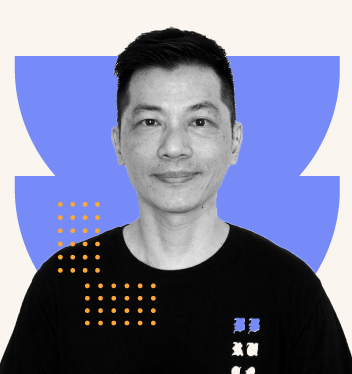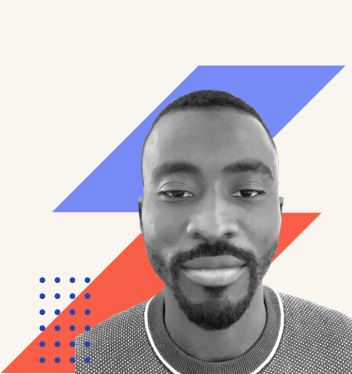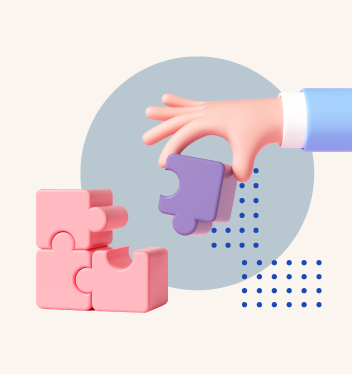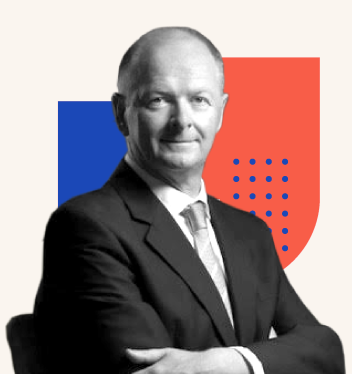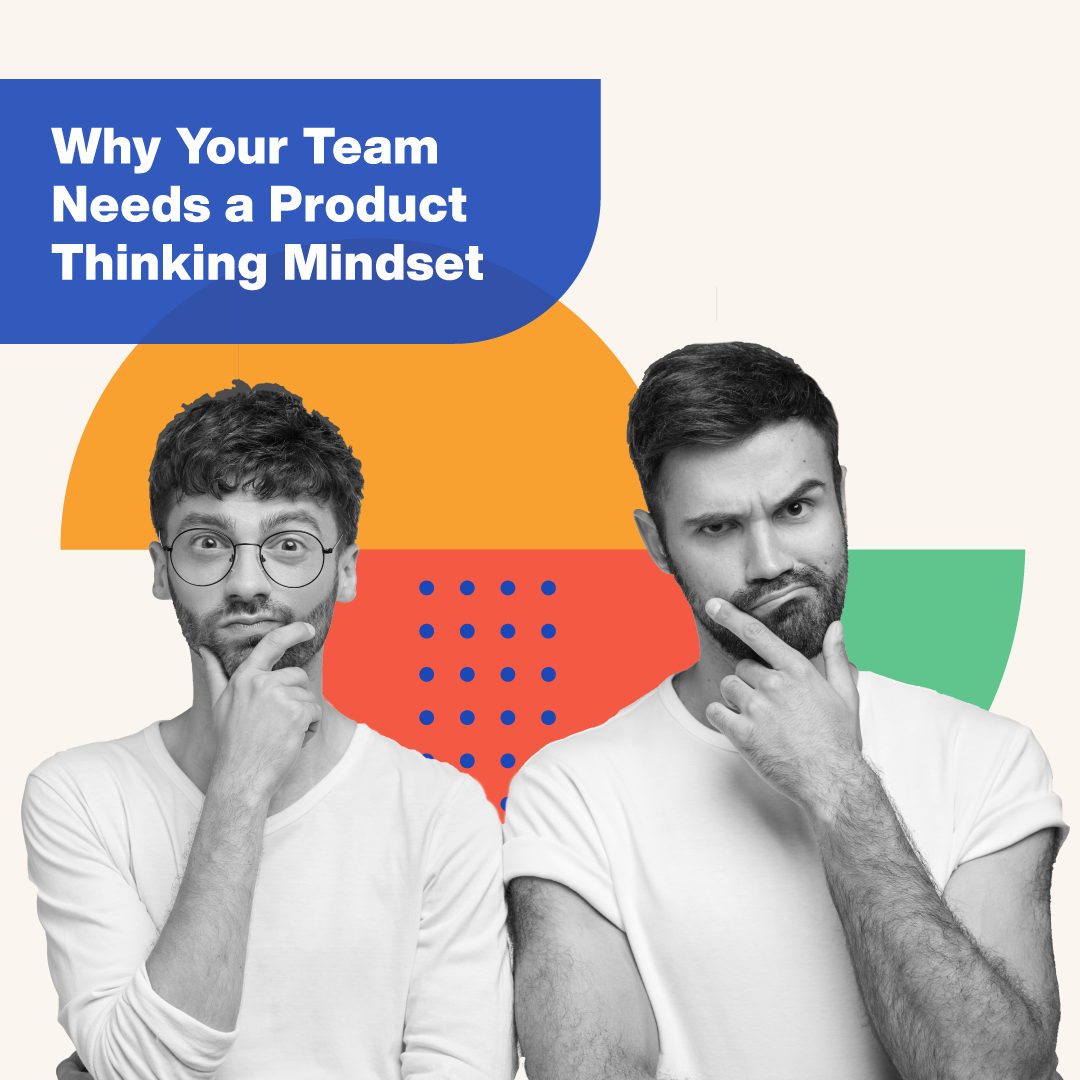“When you are determined to do something, you will find a way to accomplish it. I learned how to swim in my 40’s, and my determination took me from struggling to float in water to swimming 200 metres freestyle. I’ve put this same determination into my transition to the world of UX/UI Design. I don’t have to swim, but I’ve been determined to learn and understand design thinking.”
Hengky Stephano
Hengky Stephano is working as a UX Consultant for Optimum Solutions, and a 2021 graduate of the SGUnited Skills Programme in UX Design and Product Management, jointly delivered with the Centre for Professional and Continuing Education (PaCE@NTU).
Hengky, please tell us a bit about your early life and interests.
I was born and grew up in Indonesia. From a young age, I loved to draw, and others told me I had a talent for it! When I was finishing school, I had a consultation with my teacher – he encouraged me to go to art school. There’s an Arts and Design School in Indonesia called the Bandung Institute of Technology – I went there and graduated with a Visual Communication Design major, which opened up my graphic design career.
Did you find being a graphic designer fulfilling?
To be honest, my focus was salary, like most other people working in Indonesia. So back then I didn’t think about how fulfilled I was by my profession – I just did it. I moved between different agencies as a designer for financial reasons. If I moved often, I could negotiate a better salary than my previous company. But the downside of that was after many years I never climbed up the career ladder to a more senior role.
In 2009 you moved to Singapore from Indonesia. Why?
I moved to Singapore because my wife moved there, and I wanted to stay in the country with her. That was the main reason, but there was also a financial one. In Singapore, compared to Indonesia, I could get a much better salary and save a little more.
How was your graphic design career in Singapore?
It was good salary wise compared to Indonesia. But over the years I started to see that the industry, and agency life, is stagnant in both countries. Every agency fights for work with every other agency, and sometimes freelancers, just to get one small project or new client.
If you wanted to survive you had to fight for projects and stay on an endless treadmill of tenders and pitching. Sometimes my salary was late, and overall it was just really pressurizing for us as employees.
And it didn’t just happen to me once or twice – it happened so many times. Sometimes I did feel happy, but then the work would suddenly fluctuate, and we would panic to find new clients. I knew I needed to switch careers. I knew if I stayed in the one I was in, I might not survive. That’s the main reason I resigned from my job in December 2019, just before the pandemic arrived.
Were you able to find work in a different sector?
No. I didn’t find it easy too because I’d been working in graphic design for more than ten years. When I tried to apply to a different job in a different industry, they wouldn’t accept me because I didn’t have any experience.
That must have been so demotivating. What did you do?
Well, I decided to ‘upgrade’ myself and learn something new. I was debating between UX Design and digital marketing. I talked to a career coach, and she encouraged me to take up UX Design because it would build on my background, rather than switching to an entirely different field like digital marketing.
She helped me with my resume, and I carried on applying for jobs. Around the same time, I found out about the SG United UX/UI Design Programme offered by PACE NTU and Skills Union in Singapore. I decided to apply and got accepted! So, I told the career coach that I would stop applying for jobs and focus entirely on my six months of study.
Brave move! How did you find the course in the beginning?
The first two months were not easy for me. We had to do so much research and so many surveys and user interviews. I had to learn how to talk to people and synthesize data from research and then translate it into the design. The whole process was new to me. What helped me was working in a team. There were four of us and we decided to encourage one another and do it together.
It was very tiring, because we had to work really hard, and it wasn’t as easy as I had thought it would be! But each week, after the presentations, we felt really good. The satisfaction of doing things in a team and seeing the results of your own work was really fulfilling.
I started to really understand the process of design thinking. It was like a puzzle – you figure out the big picture as you go. I learned how to research and do things like wireframes and prototyping and human centered design.
It was not easy, but I really liked it. Unlike graphic design or visual communication, your product isn’t finished when you are. You must get feedback from your users, and it’s your responsibility to understand them and then work on your design more. I found this approach much more meaningful, and I could see the impact of my work.
Did the course get easier for you?
Yes! The instructors were extremely helpful. They’re not like teachers or professors in a school. They are real UX designers and practitioners, so they would share their experiences and tell us what we needed to know about the industry. I found it helpful to hear what life in the working world was like and not just learn theory.
After a few months, I really started to understand what our instructors were teaching us, and I could translate the theory into my practical coursework. I think hands-on learning is the most effective way. And the chance to work on real-life projects.
I was also fortunate to do a pro bono project with another team of students from my cohort. It was for a dental company in Singapore and lasted one month. In the end, the client really liked our final product! That was a very, very good experience and something I added to my design portfolio. I then did my second pro bono project through the Skills Union Portfolio Accelerator.
As you were finishing the course, how confident did you feel about getting a job?
Honestly, not very confident! Most of us were wondering if our portfolios were enough to use for job applications because we thought companies were looking for more experienced designers.
However, I have a mentor (who is also a friend) and he’s been doing UX for more than two years. He said to me that the most important thing is not how many projects you have, or how many portfolios. What your potential employer wants to know about is your thinking process. I soon found out that was true!
In an interview with my current employer, she only talked to me about my one project and all she wanted to know about was my thinking process. She didn’t care how many projects I had done – we just spoke about the one.
Did Skills Union do any career preparation with you?
Yes! For the last two months of the program, we focused on career pathing and they taught us how to create excellent resumes and find a job. I also worked with a very helpful Skills Union career coach, Rebecca. At the same time, an NTU career coach and friend of Skills Union, Eugene, heard about a company that was looking for someone with visual communication skills (graphic design) combined with UX/UI!
Rebecca recommended me to Eugene and I sent him my resume which he passed on. I received a call the very next day from the hiring manager, who wanted to do an interview with me! I now have a job as a UX consultant which started on the 10th of August 2021.
Wow, Hengky! And how is the new job going for you?
Well, I have so many things that I need to familiarise myself within my new job! But it’s okay. I’ve got a real chance in my new job to learn, and I’m very fortunate to be working in the team I am in now. Mostly because of my new manager – she’s very, very good to me. She’s encouraging me to speak up and say if or when I want to learn more about UX Design and when I want to take on more responsibility. I feel grateful to be able to work with this group.
Studying UX and UI Design has made me feel like a more complete, competent designer. I’ve switched my career focus beyond just financial rewards and I’ve realized that one should always keep in mind what is personally meaningful.
Right now, I’m learning as much as I possibly can.



